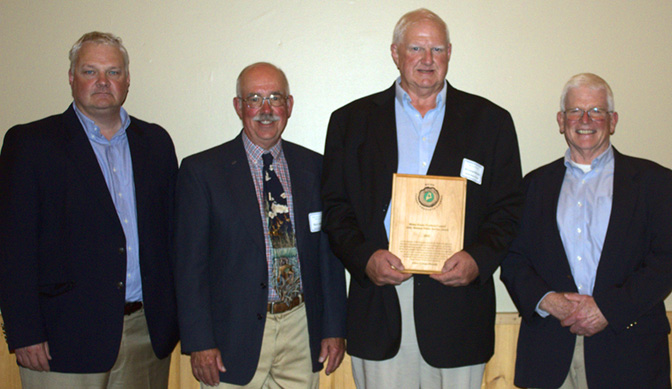
The criterion for this award is simple. The recipients must demonstrate a level of passion, loyalty, and dedication to Maine’s forest products industry, to good government, and a robust economy much the same way that our former Executive Director and friend Abigail “Abby” Holman did.
“As the director of North Maine Woods for nearly 40 years, he has been a steady advocate for forest landowners, sportsmen, and sportswomen, guides, state agencies and other land users. While many people talk about multiple use forest management, he has put it into practice, successfully blending forestry and outdoor recreation with a minimum of user conflicts.”
Barry Burgason
Abby’s love of Maine and our natural resources showed in her work. And it was here that Abby built a reputation as a fierce defender of our traditional natural resource industries.
“While ‘fierce’ is not the right adjective to describe Albro Cowperthwaite, committed, long-term and persistent certainly fit the bill,” said Barry Burgason, who presented the award.
Al worked at a single job his entire career and that was as director of North Maine Woods Incorporated, which is charged with managing public use of, now, over 3.5 million acres of private and public lands in northern Maine largely managed for forest products. He has been the primary implementer of John Sinclair’s plan to allow public recreational use of Maine’s forests and at the same time, deal with some of the abuses that can result from uncontrolled use.
Structured as a not-for-profit corporation, Al always focused on reducing the cost of operating the network of check points and campsites and still creating a safe enjoyable environment for the people that both worked and recreated within the system. In later years, Al began implementing cost saving technology such as remotely operated control points, computerized visitor registration, solar panels to reduce generator use, satellite communications and credit card payments. The remote-controlled checkpoints replaced lightly used entrances to the system thus saving labor and building maintenance costs.
However, Al was insistent that checkpoint attendants were the “Walmart greeters” that helped orient and educate visitors, many of them who have never traveled on gravel roads into remote areas without the signs and convenience stores many are used to. People will always be needed.
“I’ve been told the North Maine Woods could make a tremendous amount of money leasing acreage to sportsmen to have exclusive hunting rights. I was told I could make a lot of money doing that,” Cowperthwaite recently told Deidre Fleming, outdoors writer for the Press Herald. “That was 20 years ago. I said, ‘Yeah, we could make money – but that’s not for Maine.’”
Al was always reluctant to raise user fees both because he and his employees were the ones who took the brunt of the criticism and because he had compassion for the hunters, anglers, canoeists and campers who came to enjoy what northern Maine has to offer. Many of these people are the working people living in towns throughout Maine. In the end, Al would always say to his administrative committee of landowners, “I work for you and will do what you say.”
Al is a very organized person. At meetings, he always presented a complete agenda along with all the necessary supporting details including spreadsheets and correspondence with both the complaints and the accolades. He dealt directly with the miscreants that vandalized campsites or property, rutted roads, drove unsafely or were disrespectful of other users. The usual solution was a letter stating that they were no longer welcome in NMW.
Those who worked with Al knew him to be a very humble person. Sarah Medina and I worked with Al many years producing our annual NMW magazine. Al would often interview contractors, camp owners, guides and foresters and write an article for the publication but he never wanted to list his name as the author. Again, to save costs and avoid fee increases, Al would often recommend raises for his staff, but decline a raise for himself.
As we all know, natural resource management in Maine can get messy – politically speaking. In 1991, Al worked with landowners, land user groups and state agencies to found the Sportsmen/Forest Landowner Alliance. The purpose of the organization was to get together three or four times a year and discuss issues and friction points before they became debated in front of the legislative committees. Of all the people involved, Al saw the long-term value in this approach.
A good example of Al’s collaborative approach was the system NMW developed to address conflicts between bear hunting guides and landowners where guides would pay fees and register their hunting sites with NMW who would coordinate landowner activities that might interrupt hunting activities. The system was so successful that it spread to many forest landowners outside of the NMW system.
“While many people talk about multiple use forest management, Al has put it into practice,” Burgason said.

